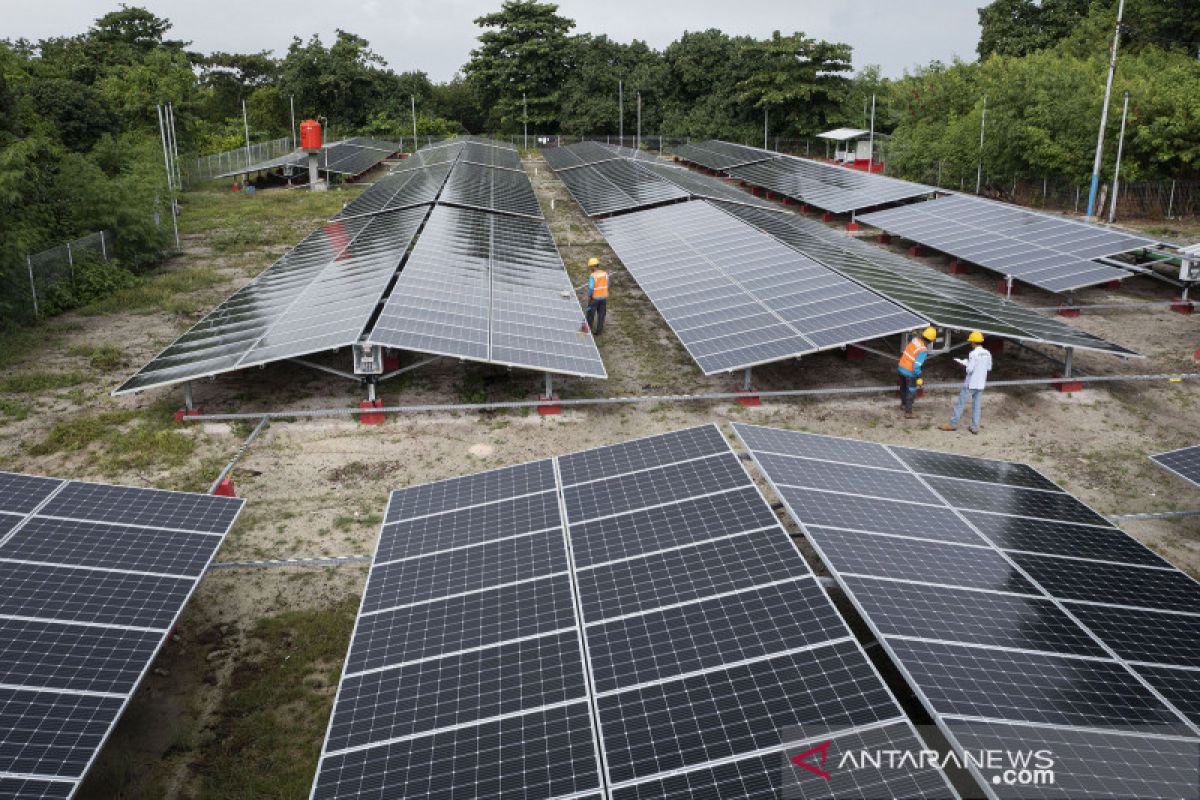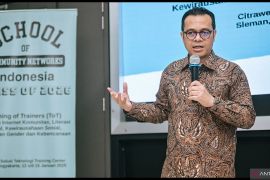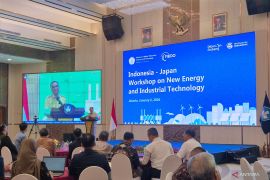Procuring electricity from solar-powered energy sources proffers myriad benefits. Solar energy is abundant, sustainable, and economically more affordable.
As energy utilization in office buildings is reduced to only five to 10 percent from its usage during daylight and working hours, electricity to power the buildings can be generated by solar panels alone without the need for other electric sources, thereby reducing much of the electricity costs.
The potential costs saved by utilizing solar panels has been one of the main factors taken into account by government agencies and private institutions to install solar panels in their premises.
According to the Ministry of Energy and Mineral Resources’ Director of New and Renewable Energy Chrisnawan Anditya, Indonesia had recorded 4,262 solar panel users by mid-2021, a significant increase from 609 users registered by the end of 2018 when the ministry’s National Movement for Million Solar Panels kicked off that year.
Moreover, National Energy Council member Satya Widya Yudha also expressed optimism that 23 percent of the nation’s electricity would be produced by renewable energy sources in 2025 if solar panel users in the country continue to increase at the current pace.
With the recent revision to the Ministry's Regulation No. 49 of 2018 on the utilization of rooftop solar panels among customers of state-owned electricity provider company PT PLN, the government has increased the maximum percentage of exportable electricity produced by private solar panels, from 65 percent to 100 percent.
The percentage rise will surely encourage more residents to install solar panels because apart from being able to produce their energy to meet their needs, they can now transfer all the electricity surplus produced by their solar panels to PT PLN and contribute to the national electricity supply through sustainable means.
Related news: ESDM Ministry to build solar park across eastern Indonesia
Responding to the increasing demand
Apart from boosting the transition to green energy, the increasing demand for solar panels translates to a new opportunity of profits for solar panel producers in Indonesia.
Increasing demand from customers also means more challenges for solar panel factories to increase their product output without compromising on their quality whilst also ensuring that their products are safe, durable, and reliable for their users.
Recently, in a bid to regulate solar panel technology, the Energy and Mineral Resources Ministry had issued Regulation No. 2 of 2021 on the implementation of a quality standard for crystalline silicon photovoltaic module products, thereby providing a legal basis for SNI certification for solar panel products in Indonesia.
Through the ministerial regulation, the government must take action by enforcing product quality regulation and ensuring all solar power products produced and marketed in Indonesia have the Indonesian National Standard (SNI) certification that proves their compatibility with the recognized standard.
Government regulations and enforcement of SNI standards will protect residents from opportunists looking to profit from solar panel technologies by creating low-quality products that may be defective and harmful.
Observing a positive outlook on solar panel utilization in Indonesia, Yudha expressed hope that local enterprises and factories would make the most of the trend and start producing quality solar panels.
Meanwhile, Anthony Utomo, who currently serves as managing director of a solar panel company Utomo SolarRUV, echoed his readiness to boost the company’s production to cater to the rising demand for solar panels.
Utomo affirmed that the commitment to abide by the SNI requirement will boost consumers’ confidence in solar panel products made by local producers, including by Utomo SolaRUV.
The company is also ready to assist in the installation of rooftop solar panels at residents' houses, business establishments, and government offices, he added.
More solar panel users in Indonesia means one step further towards green energy in Indonesia, and all stakeholders must capitalize on its huge potential.
Business partnership to expand access
To cater to the increasing number of rooftop solar panel users in Indonesia, Utomo SolaRUV has opened an opportunity for a partnership program to allow residents to open a new Utomo SolaRUV branch outlet.
Utomo explained that the partnership scheme will allow more residents to access solar panel technology and purchase the equipment for their homes.
Meanwhile, a committee member of Jakarta’s Indonesian Young Entrepreneurs Association (HIPMI), Ihsan Fadhlur Rahman, spoke of having partnered with Utomo SolaRUV in opening three new branch stores in the Greater Jakarta area.
Rahman expressed hope that his store in South Tangerang, South Jakarta, and Serpong in Tangerang District would allow locals to experience solar panel technology closer to their homes.
Moreover, Rahman noted that employees of solar panel stores that he operates can introduce solar panel technology to the customers and can also inform them about the benefits of solar panels and their operational methods and cost.
After understanding the benefits and costs of operating solar panels in their homes, the residents could then decide whether they are financially capable of installing solar panels in their homes and determine whether the installation costs will be worth the electricity costs that can be saved, the entrepreneur explained.
The transition from fossil-based energy to green energy must start sooner, and the increasing initiative among residents to install rooftop solar panels in their homes demonstrates that we have begun with the transition.
The government must support the residents’ initiative to embrace solar panels by ensuring equal distribution of clean energy resources and enforcing the SNI standards for all circulating solar panel products.
Solar panel producers should also ensure that their products are SNI-compliant; engage in greater campaigns to introduce solar panels to the masses; and innovate with the existing technology to advance the solar panel technology.
Related news: Rooftop solar panel users top 4,000: energy council
Related news: Ministry, House Commission support development of solar panel industry
Translator: Ganet Dirgantara, Nabil Ihsan
Editor: Sri Haryati
Copyright © ANTARA 2022












